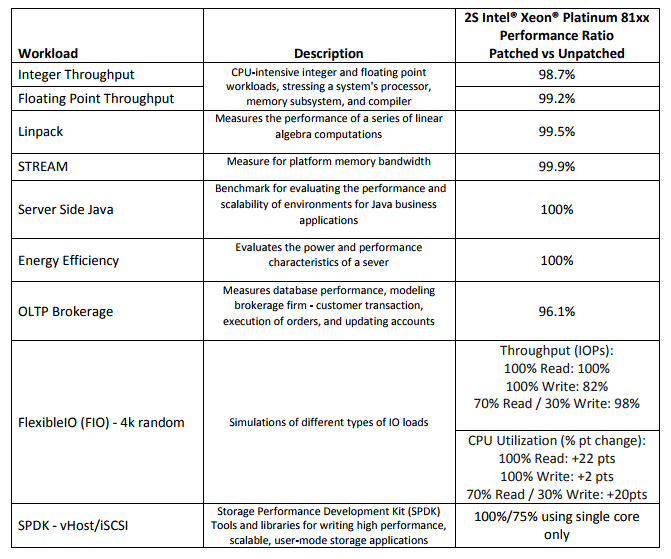Here's How Intel's Spectre And Meltdown Patch Affects Server CPUs
Last week, Intel shared initial benchmarks for its Spectre and Meltdown patch for recent consumer-focused Core i7 CPUs. Those benchmarks showed us the average performance hit we could expect when doing various tasks, with some tasks suffering a larger performance drop than others. Looking at the new benchmarks Intel shared today, the same is true on the data center side of things.
The good news is that for most tasks, Intel's data center benchmarks don't show a very big hit to performance. In a new blog post, Intel's Navin Shenoy says that his company's tests revolve around servers using two-socket Xeon CPUs, which is Intel's latest server microarchitecture. Because of this, we don't really get a full picture of the impact, but we should learn more as time goes on an Intel shares additional benchmarks.
In any case, if you're using one of these Skylake CPUs, you won't notice a very large decrease in many cases. Results show "impact ranging from 0-2% on industry-standard measures of integer and floating point throughput, Linpack, STREAM, server-side Java and energy efficiency benchmarks," Shenoy writes. We also see a 4% impact to performance in an online transaction processing benchmark, so things look good there as well.
Things are a little less encouraging when we shift to benchmarks for storage. Intel's stress tests – which, in this case, means a 100% write case – showed an 18% decrease in performance, though switching to a 70/30 read/write model improved things drastically, bringing the performance hit up to 2%. You can check out all of the results from this initial round of benchmarks in the table below.

Sharing benchmarks wasn't the only reason behind this post. Shenoy noted that Intel has now delivered firmware updates to 90% of CPUs launched in the last five years, but one side effect of that roll out is that users have been experiencing frequent reboots. Intel has been looking into the issue, and has found that it happens in configurations featuring Ivy Bridge, Sandy Bridge, Skylake, and Kaby Lake processors.
Intel has also managed to reproduce the issue, and now it's working on coming up with a solution. We don't know when an official patch for the problem will be launched, but Intel says it will be delivering microcode to its vendor partners for validation next week. As for the Spectre and Meltdown patches, more benchmarks will likely be coming down the pipeline soon, so stay tuned.
